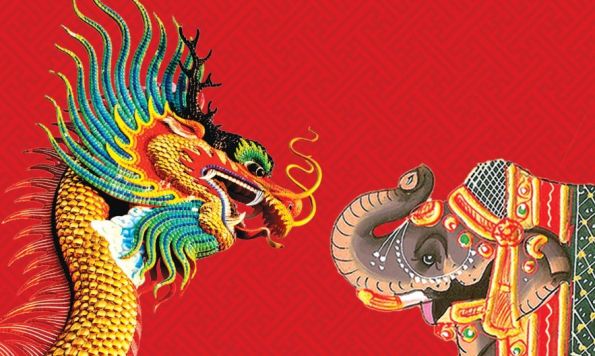India-Pakistan-China: No Alternative to Dialogue in Diplomacy

NEW DELHI: India is doing well on most counts: the economy is on the up, the government looks strong, and further advance is within its reach. Major countries that could be seen as rivals are enmeshed in their own issues and the tide is flowing against them. Now, if ever, one may have supposed, would be the time for us to break through into a different international league. But as yet there is little sign of it: domestic and not diplomatic affairs are the great current preoccupation.
To an extent, this is part of a global trend that prioritizes domestic issues above foreign affairs. USA has set the pace, as seen in President Trump’s outspoken remarks on immigration, trade and security, putting his country first and turning away from other obligations. Elsewhere too, especially in Europe, domestic affairs have been dominant in public affairs. Yet paradoxically, despite his wish to keep at a distance, President Trump has taken his country much deeper into problems far from home than did his predecessor: in Syria, where Obama remonstrated, Trump sent missiles.
Through this uncertain period India has been internationally active, as seen in the plethora of visits and bilateral agreements. This is all to the good, but some of the most important problem areas demand more attention, and of a different kind.
Among these must be counted the unfavourable developments in India-China relations that have led to misunderstandings and could have long-term implications. Even before the Dalai Lama came to Tawang last month, which set off a new chain of events, there had been concern in India about the more active Chinese policy in its maritime neighbourhood. Moreover, access routes through the High Himalayas onto the great plains of the Indian heartland are a historic Indian security concern, and Chinese road-building activity through these mountains has disquieted India.
However, if India has concerns about the mountain divide, so too does China; indeed, China’s concerns are more serious, for they are caused by restiveness in Tibet of which there is no sign of an end.
China blames India for giving shelter to the Dalai Lama but from the start India has treated his presence as a humanitarian, not a political matter, and though some elements within India have called for him to be more strongly supported, this has never been the prevalent view in New Delhi: there is no ‘Tibet card’ for India. Through all the vagaries, India has stuck to its ‘One China’ policy, which has permitted the two countries to maintain a basically equable relationship.
Diplomatic channels have remained open and regular meetings between civil and military officials have ensured that when local differences arise on the border they can be addressed and brought under control. Nevertheless, the Tawang visit of the Dalai Lama has touched a raw Chinese nerve and there have been sharp exchanges on the subject. To maintain the relationship that both sides desire it is important that the Tibet issue should be contained through regular diplomatic exchanges, as it has been for the last few decades. This needs to be a priority task.
More immediate and more threatening is the further deterioration in India-Pakistan relations. The negative drumbeat has been intense over the last few months, and a number of incidents have kept tensions high. In the process, the unfriendly exchanges have become more raucous than ever, and the level of hostility has risen markedly. The Kulbhushan Jadhav case has brought matters to a pitch and both sides have dug themselves into positions from which extrication is not simple.
Pakistan, driven by its army, insists that Jadhav is a spy and saboteur who must suffer the ultimate fate of execution. Civilian functionaries in that country, who can be expected to have a less blinkered vision, may be without effective means to oppose the military brass, so the crisis has become more intense: Pakistan continues to deny consular access to the prisoner, India insists on his return. Jadhav’s family has appealed on his behalf, but as yet there is no sign that anything is happening to avert the unimaginable tragedy.
Lack of properly functioning channels of communication has added to the complications. When, as now, doubts about the other side’s intentions are high and public opinion is greatly exercised, official exchanges can become bitter and unproductive. Yet this is precisely the time when it is necessary to be able to talk to the adversary and look for a way out of a current dilemma.
It would seem that the Indian High Commission in Islamabad asked for a meeting on Jadhav which was initially agreed to but then failed to materialize. This Indian initiative underlines the need for dialogue at this time of crisis. Though it did not lead to a result, it showed in the midst of a dangerous crisis that diplomacy and dialogue can never be set aside. If there is to be hope of the two parties reaching a mutually acceptable conclusion it would need careful diplomacy by both of them.
Nor at this time of preoccupation with immediate matters should decision makers fail to respond to the challenge of broader, longer-term issues. Among these currently one of the most testing is the strengthening of China-Pak collaboration that will follow from the ambitious economic corridor project between the two countries.
India may not be directly involved but the corridor has to be seen in strategic no less than in economic terms, for it can be construed as a concerted regional challenge by these two rivals.
Even as the diplomatic whirligig continues with a succession of high-level bilateral visits, India needs to be diplomatically engaged and alert to keep abreast of the significant longer-term developments now taking place within its neighbourhood.
(Salman Haidar, a diplomat with wide experience, retired as the Foreign Secretary of India).



